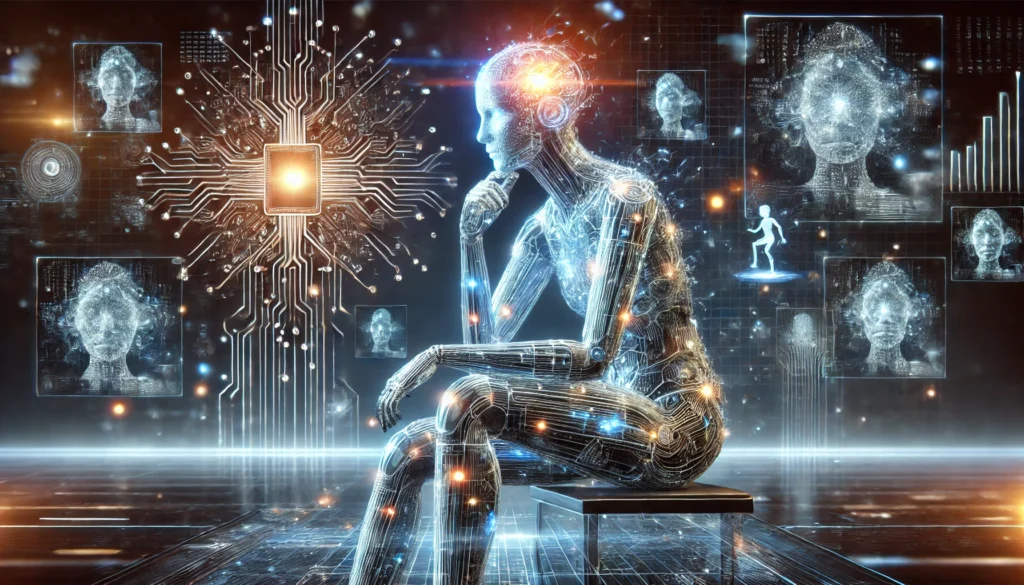
Interim CIO: Dr. Claus Michael Sattler
Artificial intelligence: intelligent or just a clever imitator?

In a world increasingly shaped by technology, the question is increasingly being asked: is artificial intelligence (AI) really intelligent? Despite impressive advances and seemingly human-like capabilities, there are good reasons to question the actual intelligence of artificial intelligence systems. This article sheds light on why artificial intelligence may not be as intelligent as is often assumed, focusing particularly on the lack of genuine emotions and the limitations in interpersonal domains.
The lack of real emotions
A central argument against the genuine intelligence of AI systems is the lack of real emotions. Although some experts, such as the renowned AI researcher Geoffrey Hinton, consider the possibility that AI systems could feel emotions such as frustration and anger in the future, this remains a highly controversial thesis [source: 1].
Hinton argues that AI systems can describe hypothetical actions that communicate feelings, such as “I’d like to punch him in the nose” as an expression of anger. However, this definition of emotion is unpopular among philosophers and raises more questions than it answers [source: 1].
The reality is that current AI systems merely reproduce statistical probabilities of emotional expressions that they have picked up through training. There is no evidence that they actually experience or understand their own emotions [source: 1].
Artificial intelligence in matchmaking: an example of the limits
A concrete example of the limits of AI intelligence can be seen in matchmaking. If artificial intelligence were really intelligent, all matches suggested by artificial intelligence in dating agencies would have to be a 100% match and the divorce rate would be 0%. However, the reality is different.
Artificial intelligence in dating apps and dating agencies analyzes a wide range of data in order to suggest potential partners who might appear compatible at first glance. This takes into account not only personal details and personal interests, but also user behavior [source: 2]. Nevertheless, human interaction remains unpredictable.
Love and attraction are profound human emotions that cannot be captured in data and algorithms. Artificial intelligence can narrow down the pool of candidates and make suggestions based on certain criteria, but it cannot make the final decision as to whether there is a deep connection between two people [source: 2].
The role of emotions in innovation
Another aspect that highlights the limits of AI intelligence is the role of emotions in innovation. Many of the most significant inventions and innovations in history were realized for emotional reasons. AI systems lack this emotional driving force, which is often the catalyst for groundbreaking ideas.
In my lectures, I regularly ask my students to make a statement: “Please name a 19th century carriage manufacturer that still builds cars today.” Please think about it and see if you can think of anyone.
Karl Benz? Far from it! Karl Benz had never produced carriages.
Emotional intelligence plays a decisive role in promoting innovation and creativity in teams. Empathy, social skills and the ability to resolve conflicts constructively are essential elements of the innovation process [source: 3]. AI systems cannot imitate or replace these complex interpersonal dynamics.
The importance of emotional intelligence for innovation
Emotional intelligence is a key factor for successful innovation:
- Empathy as a driver of innovation: Empathic employees and managers can sense the emotional needs of their counterparts and thus build stronger trust and a deeper connection within the team. This fosters an environment in which ideas circulate freely and creative thinking is stimulated [source: 3].
- Social skills: Emotional intelligence also includes social skills such as cooperation and effective communication. These skills are essential for promoting team innovation [source: 3].
- Conflict management: Conflicts can be fertile ground for innovation, as they encourage people to think outside the box and question established patterns. Emotional intelligence is the key to drawing creative potential from conflicts [source: 3].
Let’s stick with the example of Karl Benz. Take any artificial intelligence and ask it the following question: “Dear …, I am a carriage manufacturer in the 19th century and I am looking for the one innovation that will enable me to sell even more carriages to even more people.” After exactly 1,000 repetitions, we had finished the experiment. None of the AIs tested came up with the idea of replacing the horse with a motor.
Real-life examples of the importance of emotional intelligence
Companies such as Google and Pixar rely heavily on a culture that promotes openness and mutual understanding – with impressive success:
- Project teams at Google that are supported by ‘psychological safety’ show a higher willingness to take risks in the creative process and thus an increased innovation rate [source: 3].
- At Pixar, great emphasis is placed on open exchange, encouraging employees to freely express creative ideas – a practice that is reflected in groundbreaking animated films [source: 3].
These examples illustrate how important emotional intelligence and interpersonal dynamics are for the innovation process – aspects that AI systems cannot replicate.
The limits of artificial intelligence emotion recognition
Despite advances in AI emotion recognition, significant limitations remain. While AI models can quickly recognize emotions in certain contexts, they lack the deeper understanding and ability to respond appropriately to these emotions [source: 4].
The recognition of emotions by artificial intelligence is based on the analysis of surface features such as facial expressions or voice patterns. However, this is a far cry from a true understanding of the complex human emotional world [source: 4].
Conclusion
Artificial intelligence - a powerful tool, but not real intelligence
In summary, while AI shows impressive capabilities in certain areas, it is still a long way from true intelligence. The lack of genuine emotion, the inability to fully grasp the complexity of human relationships and the inability to replicate the emotional driving force behind human creativity and innovation are clear indications that AI in its current form is not truly intelligent.
AI remains a powerful tool that can be useful in many areas, but it cannot replace the depth and complexity of human intelligence and emotional experience. The real strength lies in combining human emotional intelligence with the analytical capabilities of AI to find innovative solutions to complex problems.
While the development of AI is undoubtedly fascinating and remains something to watch, we should critically question what we mean by “intelligence” and whether AI systems will ever be able to match the full range of human cognitive and emotional abilities.
Sources
- https://the-decoder.de/ki-forscher-geoffrey-hinton-glaubt-dass-ki-gefuehle-hat-oder-haben-wird/
- https://www.mind-verse.de/news/kuenstliche-intelligenz-und-die-suche-nach-dem-perfekten-partner
- https://www.emotionale-intelligenz.info/emotionale-intelligenz-und-innovationsmanagement/
- https://www.netzwoche.ch/studien/2024-04-15/ki-erkennt-emotionen-innert-sekunden
- https://www.trennung.de/scheidungsstatistik-2022.html
- https://www.hrtoday.ch/de/article/warum-wir-jetzt-mehr-denn-je-auf-emotionale-intelligenz-setzen-muessen
- https://www.aktuelle-technik.ch/kuenstliche-intelligenz-gefuehle-sind-nicht-abbildbar-a-dd19ef6cca65a2fa4fec4ff2467401e2/
- Image: ChatGPT